|
|
|
Sort Order |
|
|
|
Items / Page
|
|
|
|
|
|
|
| Srl | Item |
| 1 |
ID:
160403
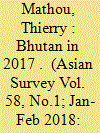

|
|
|
|
|
| Summary/Abstract |
Bhutan’s agenda in 2017 was dominated by the preparation for the third parliamentary elections (slated for 2018), the 12th Five-Year Development Plan (2018–23), and the golden jubilee of the establishment of diplomatic relations with India. A military standoff between China and India on Bhutan’s border highlighted the kingdom’s strategic regional position.
|
|
|
|
|
|
|
|
|
|
|
|
|
|
|
|
| 2 |
ID:
161817
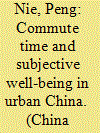

|
|
|
|
|
| Summary/Abstract |
Using data from the 2010 China Family Panel Studies, this study investigates the association between commute time and subjective well-being in a sample of 16- to 65-year-old employees in urban China. We find evidence that a longer commute time is associated with lower levels of both life satisfaction and happiness, especially when the commute times are extreme (≥ 1 hour per day). A multiple mediation analysis further indicates that the relation between commute time and happiness is partially mediated by the time spent on daily activities, particularly sleep. We also calculate the amount of income necessary to compensate an employee's loss in well-being at approximately 82 yuan per hour of commute time, implying that in urban China the annual loss of well-being amounts to around 10 billion yuan.
|
|
|
|
|
|
|
|
|
|
|
|
|
|
|
|
| 3 |
ID:
185721
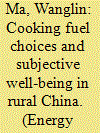

|
|
|
|
|
| Summary/Abstract |
This paper examines the impacts of cooking fuel choices on individuals' subjective well-being, measured by happiness and life satisfaction, using open-access data from the 2016 China Labor-force Dynamics Survey. We analyze the impacts by employing a multivalued treatment effects model that accounts for selectivity bias. Unlike previous studies that consider households' binary fuel use decisions or specific fuel choices, we capture the households' fuel-stacking behaviors (using multiple fuels) by classifying cooking fuels into clean fuels, non-clean fuels, and mixed-fuels. The empirical results show that complete energy transition (i.e., switching from either non-clean fuels or mixed fuels to clean fuels) significantly improves individuals' happiness and life satisfaction. In comparison, incomplete energy transition (i.e., shifting from non-clean fuels to mixed fuels) does not significantly impact individuals' subjective well-being. A complete energy transition increases people's subjective well-being in the eastern and central parts of China but has no impact on those living in western China. Furthermore, switching from non-clean fuels to clean fuels significantly reduces happiness inequality and life satisfaction inequality. Switching to cleaner fuels also significantly increases individuals' self-reported health. We recommend that the government in China make concerted efforts to ensure access to affordable, reliable, sustainable, and clean energy sources and accelerate rural households' energy transition.
|
|
|
|
|
|
|
|
|
|
|
|
|
|
|
|
| 4 |
ID:
193221
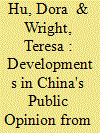

|
|
|
|
|
| Summary/Abstract |
This original analysis of the World Values Survey waves of 2007, 2012 and 2018 reveals important relationships among political trust and satisfaction, happiness, views of corruption, local elections and activism from the last half of the Hu Jintao administration through the first five years of Xi Jinping's rule. These data shed new light on the deeper dynamics underlying the high and growing levels of trust in government documented in other studies. Among this report's more novel findings, we find increased trust in government coincides with decreased local electoral participation, suggesting that participation in local elections is not key to perceptions of regime legitimacy. Views of corruption and a sense of personal efficacy through non-institutionalized forms of political participation such as peaceful demonstrations appear more relevant. Thus, constraints on people's ability to engage in peaceful demonstrations are likely to negatively impact views of regime legitimacy. In addition, the report uncovers demographic variations in these dynamics, indicating that regime legitimacy is more precarious among citizens at the bottom of the socioeconomic hierarchy and among younger Chinese. Overall, these findings complicate existing explanations of regime legitimacy centring on economic performance, nationalism, responsiveness/adaptiveness and efforts to combat corruption.
|
|
|
|
|
|
|
|
|
|
|
|
|
|
|
|
| 5 |
ID:
187843
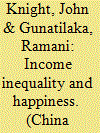

|
|
|
|
|
| Summary/Abstract |
The effect of inequality on happiness should intrigue social scientists. Of the many dimensions of income inequality, we explore four, analysing a rich data set for China. Does actual or perceived inequality have a greater effect on happiness? We find that perceptions of inequality are the more important. How broad is the reference group with which people compare themselves? They report that it is narrow; and indeed narrowly defined inequality has the greater effect on happiness. Do perceptions of the degree of fairness of inequality matter? They do, as they ameliorate the adverse effect of inequality on happiness, especially for the poorest. Is it self-centred or community-based inequality which affects happiness? Both measures have significant effects, but in opposite directions. The research and policy implications are discussed.
|
|
|
|
|
|
|
|
|
|
|
|
|
|
|
|
| 6 |
ID:
116508
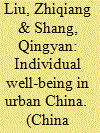

|
|
|
|
|
| Publication |
2012.
|
| Summary/Abstract |
Using household survey data, we study the determinants of individual well-being in urban China, emphasizing particularly the role of income expectations. First, we find that individual well-being increases contemporaneously with own income and decreases with community's average income, consistent with findings reported in previous studies. This result holds when we replace income with consumption and when we consider employment and health status of other family members. Second and more important, we find that income expectations have a positive and significant effect on individual well-being. This result is robust to alternative model specifications and to controls for optimistic personality. Instrumental variable estimates and endogeneity tests suggest that the positive relationship between well-being and income expectations is genuine. Our finding has the potential to explain why reported well-being has declined in China despite the spectacular economic growth in the past decades.
|
|
|
|
|
|
|
|
|
|
|
|
|
|
|
|
| 7 |
ID:
117568
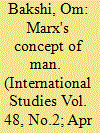

|
|
|
|
|
| Publication |
2011.
|
| Summary/Abstract |
For long, the feeling has been that Marx views man essentially in terms of his material interests. The publication of Economic and Philosophical Manuscripts, however, has led many to realize that he is keenly interested in developing individual potentialities, realizing 'human essence' and nurturing talents. What is interesting, however, is that Marx relies on productive activity, on labour, to give meaning to life. How work in factories, however rationally organized, can be a source of joy and fulfilment is hard to see. It is, therefore, not surprising that when he touches upon these issues in later writings, few though these occasions are, he relies more on intellectual, literary and artistic pursuits than on labour. No matter which activity we pursue, however, we can profitably pursue it, says Marx, only in a communist society. Thus, he attaches great importance to reorganizing the economic aspect of society. But strangely he does not think that bringing about these changes, building a better society, would give meaning to life. In any case, Marx's plea to develop potentialities, realize 'human essence' and foster creativity did not have much relevance for societies characterized by poverty, privation and exploitation that existed in his time. It is, therefore, not surprising that in his later writings he is concerned more about the problems facing society, especially the miserable condition of workers. This leads him to make a careful analysis of the existing reality. Those interested in the study of politics and society today, especially in countries like India, which are facing major problems, need to pay more attention to the approach Marx adopts in his later writings.
|
|
|
|
|
|
|
|
|
|
|
|
|
|
|
|
| 8 |
ID:
182810
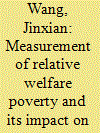

|
|
|
|
|
| Summary/Abstract |
Individual or household income has been the conventional yardstick of poverty. Presently, non-income factors are universally accepted as measures of poverty. Attention on the multiple dimensions of poverty and their policy implications has been growing in the past 20 years. However, few studies have analyzed relative multidimensional poverty, especially in China. Moreover, the relationship between relative welfare poverty and happiness has been rarely studied, particularly given that the decline of poverty seemed not bringing a significant increase in happiness in China. This research gap is noteworthy because enhancing the subjective well-being of the people is crucial to a nation's sustainable economic development. On the basis of the micro-level data from China General Social Survey, this study puts forward a welfare approach to analyzing the relative multidimensional poverty and then determines the link between relative welfare poverty and individual happiness. Our results show that 1) relative welfare poverty has not declined significantly and 2) there is a significantly happiness-reducing effect of relative welfare poverty.
|
|
|
|
|
|
|
|
|
|
|
|
|
|
|
|
| 9 |
ID:
153034


|
|
|
| 10 |
ID:
092530
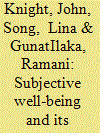

|
|
|
|
|
| Publication |
2009.
|
| Summary/Abstract |
A national household survey for 2002, containing a specially designed module on subjective well-being, is used to estimate pioneering happiness functions in rural China. The variables that are predicted by economic theory to be important for happiness prove to be relatively unimportant. Our analysis suggests that we need to draw on psychology and sociology if we are to understand. Rural China is not a hotbed of dissatisfaction with life, possibly because most people are found to confine their reference groups to the village. Relative income within the village and relative income over time, both in the past and expected in the future, are shown to be important for current happiness, whereas current income is less so. Even amidst the poverty of rural China, attitudes, social comparisons and aspirations influence subjective well-being. The implications of the findings for the future and for policy are considered.
|
|
|
|
|
|
|
|
|
|
|
|
|
|
|
|
| 11 |
ID:
161808
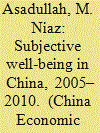

|
|
|
|
|
| Summary/Abstract |
We use data from two rounds of the Chinese General Social Survey (CGSS) to study the determinants of subjective well-being in China over the period 2005–2010 during which self-reported happiness scores show an increase across all income groups. Ordered probit regression analysis of well-being reveals large influence of gender, rural residency, and household income. After controlling for demographic attributes, health status, unemployment status, number of children, agricultural hukou (household registration identity) and educational attainment, household assets, the influence of past and future income, and province dummies, we find that women, urban residents, and people with higher income are happier in China. More schooling, better health, and being employed are positively and significantly correlated with well-being. Sub-sample analysis reveals that the rich only care about relative income whereas the effect of absolute income dominates in case of the poorer section. The influence of absolute income is larger among women compared to men and in turn explains why women, despite being poorer, are happier in China, conditional on socioeconomic differences. On the other hand, rural residents are poorer than urban residents so that conditional on having the same income, there is no rural–urban happiness gap. Our results suggest that while further decline in poverty will enhance well-being in China, policies that reduce rural–urban and gender inequalities are also likely to boost well-being.
|
|
|
|
|
|
|
|
|
|
|
|
|
|
|
|
| 12 |
ID:
162087
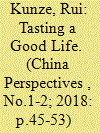

|
|
|
|
|
| Summary/Abstract |
This essay mainly examines the documentary A Bite of China 2 (2014), which presents culinary culture as everyday practices displaying an “authentic” Chinese way of perceiving and pursuing happiness. This is a media artefact produced by CCTV, a cultural institution of postsocialist China, whose duty of promoting state ideology, drive for profit, and the various cultural positionings of its employees negotiated with each other in shaping this audio-visual text characterised by fissures and incoherence. In this text, narratives and counter-narratives of happiness interweave. Their reception is further complicated by an audience made up of various interpretive communities with different social and cultural backgrounds as well as cultural competence. Both the text and its reception reveal that the notion of happiness is complex and contested in such a drastically changing country as China.
|
|
|
|
|
|
|
|
|
|
|
|
|
|
|
|
| 13 |
ID:
163508
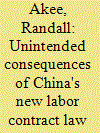

|
|
|
|
|
| Summary/Abstract |
China's new Labor Contract Law, which intended to strengthen the labor protection for workers, went into effect on January 1, 2008. The law stipulated that the maximum cumulative duration of successive fixed-term (temporary) labor contracts is 10 years, and employees working for the same employer for more than 10 consecutive years are able to secure an open-ended (permanent) labor contract under the new law, which is highly desirable to employees. However, in order to circumvent the new Labor Contract Law, some employers may have dismissed workers, after the passage of the new law, who had worked in the same firm for more than 10 years. Using data from the 2008 China General Social Survey, we find strong evidence that firms did in fact dismiss their formal-contract employees who have been employed for more than 10 years. Additionally, using a regression discontinuity design based on this exogenous change in unemployment status for this particular group of workers, we show that the dismissed workers suffered significant welfare loss in terms of happiness. Our results are robust to various specifications and placebo tests.
|
|
|
|
|
|
|
|
|
|
|
|
|
|
|
|
| 14 |
ID:
145912
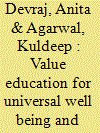

|
|
|
|
|
| Summary/Abstract |
Globally, the society today is caught in the grip of distressing problems like drugs, violence, racism, terrorism, decline of education and breakdown of the family unit. The psychological state of the people of the world is a complete wreck as we see unchecked desires and base instincts at work wherever we look. What is being called into question is humanity itself. The very foundation of our civilization and the criteria by which we define humanity are in great peril, creating an unprecedented crisis of humanity and human nature.
|
|
|
|
|
|
|
|
|
|
|
|
|
|
|
|
|
|
|
|
|